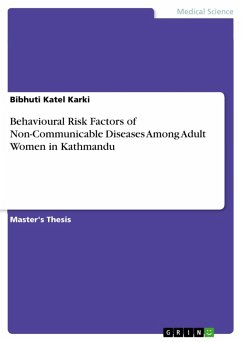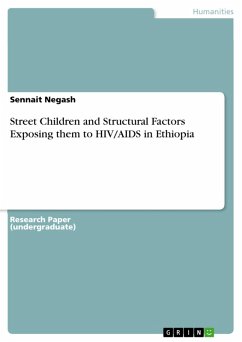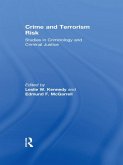Master's Thesis from the year 2015 in the subject Nursing Science - Nursing Management, grade: 1, Tribhuvan University (Institute of Medicine), course: Masters in Nursing, language: English, abstract: Non-Communicable Diseases are the leading cause of death worldwide causing nearly 80% of deaths in low and middle-income countries. The World Health Organization has identified certain risk factors that are associated with an increase in the occurrence of Non-Communicable Diseases: they are physical inactivity, tobacco use, alcohol use and unhealthy diets. A cross-sectional descriptive research design was used to assess the status of behavioural risk factors regarding Non-Communicable Diseases among the adult women of Gothatar Village Development Committee, Kathmandu. A total of 156 women were taken by using cluster random sampling technique. A semi-structured questionnaire developed on the basis of Non Communicable Diseases Risk Factors: STEPS Survey Nepal 2013 was used and face to face interview was done to collect the data. The analysis was done by using descriptive statistics (frequency, percentage, mean, standard deviation) and inferential statistics (Chi Square test, Fisher's exact test and Odds ratio). The finding of the study revealed that 91.9% of women were taking inadequate fruit and vegetables as recommended by World Health Organization. Current smoking was present in 7.7% respondents, where older people were more likely to be current smoker (p=<0.001), current alcohol consumption was present in 7.1 % and was higher in underprivileged (p=0.020). Physical inactivity was found in 6.4% with 6 time higher prevalence among older age group. Nearly half (51.9%) of women were found to be overweight and obese. Systolic hypertension was present in 9% and diastolic hypertension in 13.5% of the respondent. The finding of study concluded that the use of smoking was higher among older women and among those women with education level below primary level. Alcohol consumption was found to be more among women of underprivileged group. The study highlighted the poor dietary habit among women indicating the need of education and awareness raising programs on diet and nutrition.
Dieser Download kann aus rechtlichen Gründen nur mit Rechnungsadresse in A, B, BG, CY, CZ, D, DK, EW, E, FIN, F, GR, HR, H, IRL, I, LT, L, LR, M, NL, PL, P, R, S, SLO, SK ausgeliefert werden.









